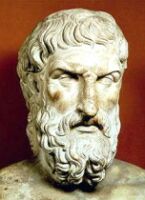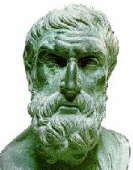
Epicurus was born in the Greek colony on Samos, but spent most of his active life in Athens, where he founded yet another school of philosophy. At "the Garden," Epicurus and his friends lived out their ideals for human life, talking about philosophical issues but deliberately detaching themselves from active involvement in social affairs.
Epicurus whole-heartedly adopted the atomism of Leucippus and Democritus, maintaining that all objects and events—including human lives—are in reality nothing more than physical interactions among minute indestructible particles. As they fall toward the center of the earth, atoms swerve from their paths to collide with each other and form temporary compound beings.
 There is no necessity {Gk. anagkh [anankê]} about any of this, of course; everything happens purely by chance.
There is no necessity {Gk. anagkh [anankê]} about any of this, of course; everything happens purely by chance. In his Letter to Menoeceus and Principle Doctrines, Epicurus discussed the consequences of this view for the human attempt to achieve happiness. Since death is a total annihilation that cannot be experienced, in our present lives we need only live a simple life and seek always to avoid physical pain. It is pleasure, understood in this negative sense, that is the highest good for Epicurus. Freedom from mental disturbance {Gk. ataraxia [ataraxia]} is the very most for which one can hope.
Epicurus
(341-270 BCE)
| Life and Works . . Epicureanism Bibliography Internet Sources |
| Recommended Reading: Primary sources:
Secondary sources:
Additional on-line information about Epicurus includes:
|









